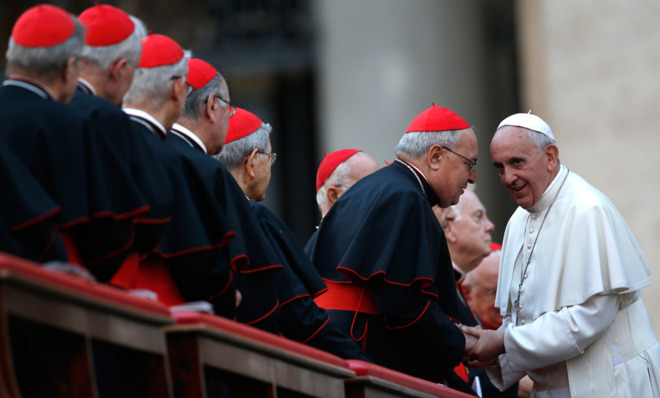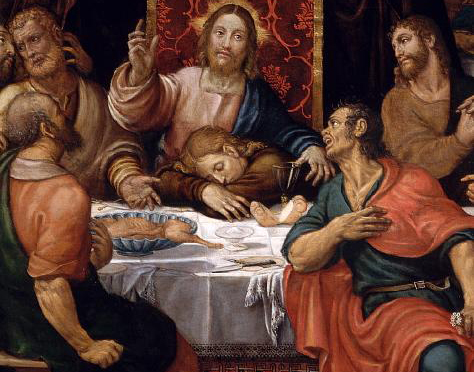Why churches should brace for a mass exodus of the faithful
The more conservative churches, anyway


A free daily email with the biggest news stories of the day – and the best features from TheWeek.com
You are now subscribed
Your newsletter sign-up was successful
A few weeks ago, I wrote about how the sweeping acceptance of gay marriage in recent years is owed in large part to Christianity. Rejecting the rigidly hierarchical and stratified societies of the ancient world, Jesus Christ taught the equal dignity of all persons, proclaimed that the meek shall inherit the earth, and declared that the last shall be first and the first shall be last. The Western world has been working out the logic of these subversive teachings ever since, with the institutional transformation of marriage being the latest, though surely not the last, example of its social, moral, and political consequences.
But what if the next institutions to be leveled by the Christian ideal of equality are the churches themselves?
I'm not talking about all of the churches. I mean those that have resisted reforming themselves in light of women's equality — and specifically those that resist this reform from the top down, with ecclesiastical authorities enforcing male-centered dogma and doctrine. That's mainly the Roman Catholic Church and the Church of Jesus Christ of Latter-day Saints (the Mormons).
The Week
Escape your echo chamber. Get the facts behind the news, plus analysis from multiple perspectives.

Sign up for The Week's Free Newsletters
From our morning news briefing to a weekly Good News Newsletter, get the best of The Week delivered directly to your inbox.
From our morning news briefing to a weekly Good News Newsletter, get the best of The Week delivered directly to your inbox.
A contrast with Protestantism and Judaism is instructive. There are, of course, many gender traditionalists in both faiths — evangelical Protestants and Orthodox Jews. But there is no overarching authority in either religion stipulating that traditionalism is the only valid form of belief. That means there are other options besides apostasy for dissenters. Don't like the traditionalism of your congregation? If you're a Protestant, you can find a more liberal, mainline alternative. If you're a Jew, look for a Conservative, Reform, or Reconstructionist synagogue.
But in both Catholicism and Mormonism, there's often nowhere else to go. It's either love it or leave it.
I think it's likely that over the coming years these churches are going to confront a stark choice: Reform themselves in light of equality or watch their parishioners opt for the exits. In droves.
Think about it: Men and women in the pews now live in a world in which nearly all obstacles to women's equality have been torn down. Where once women were relegated to submissive and subservient roles in the family, now domestic gender egalitarianism is the norm. Where once women were excluded from participating in politics — including denial of the vote — such strictures are now unimaginable. Colleges and universities that were once all-male have become coed. Just about every career that once excluded women is now open to them — including that most traditionally masculine occupation, military service. And so forth.
A free daily email with the biggest news stories of the day – and the best features from TheWeek.com
None of this is new. But this is: The churches are now largely populated by people who have no living memory of it ever having been otherwise. Living, studying, working, and voting in a world marked by ever-increasing recognition of the equal dignity of men and women, they go to church on Sunday and confront our culture's last significant institutional vestige of inequality — when that very institution worships the God who is the ultimate source of our egalitarianism.
The contradictions are unsustainable.
And they've already started to have a destabilizing impact.
Last year, several Mormons formed a group called Ordain Women and tried to gain admission to the all-male priesthood session of the church's semiannual General Conference at Temple Square in Salt Lake City. They were turned away. In an effort to avoid a repeat demonstration, the church has now banned the group from Temple Square during the upcoming General Conference on April 5. While a 2011 poll found that only 8 percent of Mormon women (and, oddly, 13 percent of Mormon men) support extending priestly ordination to women, this defensive move by the church is bound to raise the profile of the group and its cause. Combined with broader cultural trends in favor of equality, those numbers are bound to rise in the coming years.
If they do, the LDS church will face a crisis, since Mormon theology and folk beliefs are far more profoundly gendered than mainstream historic Christianity. The patriarchal nuclear family mirrors a divine familial arrangement led by an authoritative male God (Father in Heaven) who has his own obedient and deferential wife (Mother in Heaven). Opening the Mormon priesthood to women would challenge these doctrines in a way that could strike at the foundations of the church — far more so than the decision to permit the ordination of blacks in 1978. On the other hand, refusing to reform could eventually drive large numbers of younger, egalitarian-minded Mormons away from the church.
The Catholic situation is even more volatile. American Catholics have become accustomed to worshipping in a state of cognitive dissonance, with a majority rejecting the church's sexual teachings, and an overwhelming majority (something in the range of 98 percent) dismissing its strictures on artificial birth control. This is relatively easy to do, because these issues don't come up very often in Mass.

By contrast, the majority of Catholics who support women's ordination are confronted on the altar with the all-male priesthood every time they go to church. At the moment, frustration about the issue is muted because Pope Francis has inspired so much good will among the faithful — and raised such high hopes for reform. That has given the church some breathing room.
But it isn't going to last. As I've argued at length, there is no indication that anything of doctrinal substance is going to change under the new pope — and least of all on the ordination of women, a subject on which Francis has explicitly endorsed Pope John Paul II's position, which unequivocally dismissed the possibility. Sooner or later — and probably sooner — egalitarian-minded Catholics are going to lose their patience with the hierarchy's unpersuasive defenses of the status quo.
And they are stunningly unpersuasive. Here is the argument in its entirety: Christ chose 12 men to be his apostles; they in turn chose men to help them spread the word of God; today's priests and bishops are the direct descendants of these original apostles; therefore, the church doesn't have the power to ordain women.
The church would be on much firmer ground if the Gospels recorded Christ explicitly stating that he chose men to be his apostles because it is God's will that only men can serve in that role. But of course he said no such thing. A weaker but at least potentially defensible argument would involve some sort of claim about the nature of women being incompatible with ordination. But the church makes no such argument. Alternatively, the church could appeal to a popularly held gendered vision of God like the one affirmed by the Mormons. But the church doesn't do that either.
As it is, Catholics are left with: This is the way we do it, because we've always done it that way, and we can't change, so drop it.
The ideal of equality has transformed the family, the workplace, the military, the political world, and countless other areas of life — and the church thinks it can hold back the tide with this?
I'll go out on a limb and predict that it isn't going to work.
When parishioners finally get fed up, the only remaining question will be whether the church will respond creatively and adapt to the demands of justice and equality — or if, instead, it will choose intransigence. And watch the People of God march right out the door.
Damon Linker is a senior correspondent at TheWeek.com. He is also a former contributing editor at The New Republic and the author of The Theocons and The Religious Test.
-
 House votes to end Trump’s Canada tariffs
House votes to end Trump’s Canada tariffsSpeed Read Six Republicans joined with Democrats to repeal the president’s tariffs
-
 Bondi, Democrats clash over Epstein in hearing
Bondi, Democrats clash over Epstein in hearingSpeed Read Attorney General Pam Bondi ignored survivors of convicted sex offender Jeffrey Epstein and demanded that Democrats apologize to Trump
-
 Are Big Tech firms the new tobacco companies?
Are Big Tech firms the new tobacco companies?Today’s Big Question Trial will determine if Meta, YouTube designed addictive products
